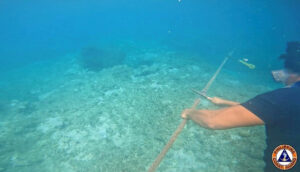Uniting Philippine society in securing our maritime interests

Accounts of the audacity of the Chinese in our territorial seas are becoming all too familiar. Last week we heard about how the Chinese Coast Guard put floating barriers in the waters off Panatag Shoal. We noted with relief that our officials decisively ordered the removal of these barriers.
This was not the first such incident this year. In February, the Chinese pointed a military-grade laser at one of our boats, causing a Philippine Coast Guard (PCG) officer to temporarily go blind. In August, they fired water cannons at our vessels that were on a resupply mission to the BRP Sierra Madre off Ayungin Shoal. Notwithstanding widespread condemnation from Philippine officials and other countries, succeeding resupply missions to the Sierra Madre remained marked by the menacing maneuvers of Chinese boats. And then, toward the end of August, China released a “new standard map” that used a 10-dash line to lay claim to vast areas of the South China Sea, including the West Philippine Sea. This completely disregards the 2016 ruling of the Permanent Court of Arbitration that China’s nine-dash line has neither legal nor historical basis.
These gray zone operations perpetrated by an expansionist, hegemonically ambitious, and antagonistic state are being addressed through a combination of initiatives — by our own defense forces, collaboration with other sectors in Philippine society, and through cooperation with like-minded states that respect the rules-based international order.
But these are not all.
Reports of the destruction of our coral reefs are equally alarming. They very clearly demonstrate the need to do something not only to defend our territorial integrity, but to secure our marine resources for this generation and those that will come after. The PCG has confirmed that Philippine coral reef systems, specifically the Rozul Reef and Escoda Shoal, have suffered great damage owing to destructive activities by foreign agents. We can now add coral harvesting as a manifestation of an expansive, aggressive, and rogue agenda that threatens peace, stability, and ecological balance in our waters.
I take heart in the comprehensively articulated vision of our National Security Policy Framework: “A free, resilient, peaceful and prosperous maritime and archipelagic nation, at peace with itself and its neighbors, enabled and protected by a reliable defense and public safety system.” Certainly, this covers our concerns about our coral reefs, with its implications on biodiversity, ecological balance, and climate change resiliency. Illegal coral harvesting as well as artificial island building are just some of the non-traditional security challenges, which we must learn to address through unconventional, innovative, and science-driven means.
A Stratbase-commissioned survey done by Pulse Asia in late 2022 reveals what Filipinos feel are the important reasons to strengthen our ability to defend and protect our seas: “To protect marine resources and the environment in Philippine territory” (53%), and “To protect the rights of peoples in the coastal communities” (22%).
This, I believe, provides a solid basis for the attention now being given to a wider range of maritime security issues, that include territorial integrity and sovereignty, but also environmental sustainability. The pronouncement of our government leaders — President Ferdinand Marcos, Jr., for instance, said that only the national interest will dictate the government’s foreign policy, and various officials have condemned China’s acts in the West Philippine Sea — strike at the heart of our patriotism. We must protect and defend what is ours and reject any attempts by others to encroach upon our territory that had already been established as ours alone. More than this, we must also be aware that in these seas lie our future, our symbiosis with nature, and the sustainability of all marine life in our territory.
Clearly, this is a responsibility not restricted to government leaders. Our pursuit of maritime security highlights the need for a whole-of-society approach, because each actor and group have its own expertise that it brings to the table. Partnerships are not only desirable; they are necessary.
A week ago, the Stratbase ADR Institute held a forum that delved on how to implement a comprehensive Philippine maritime framework to advance the rule of law. Scientists and academics, policy makers, members of the military and of the diplomatic community joined us as we pieced together the various crucial components of maritime security that must be everybody’s business.
For example, we learned that scientists are putting resources to good use as they do their best to build a solid scientific foundation and body of knowledge about our seas. We were updated on the current efforts being undertaken by the scientific community as well as their policy recommendations. We were apprised of how exactly the military is responding to threats not only to our territorial integrity but also to our marine environment. We listened to the many ways we can learn from our international partners like Australia on how to build a resilient and sustainable future.
Indeed, the state, the private sector, and civil society all have their respective roles in this whole-of-Philippine society approach. The state and the private sector can undertake public-private partnerships on critical projects. Government and civil society organizations can collaborate to address human security issues and urgent national concerns. The private sector and civil society, for their part, can focus on investment-led and job-generating growth. Academics of course are using their expertise in ensuring that policies and other decisions have a sound empirical basis. The media can help by bringing the issue and clarifying it so that ordinary Filipinos would have greater awareness and knowledge of just how high the stakes are.
As we watch the news or read the papers and see yet newer reports of incursions into our precious seas, may we remember that the solution lies not in the military alone. Marine security is a civilian issue as well because it challenges and threatens our way of life. Our sustainable future hinges on what we do about this today.
Victor Andres “Dindo” C. Manhit is the president of the Stratbase ADR Institute.




